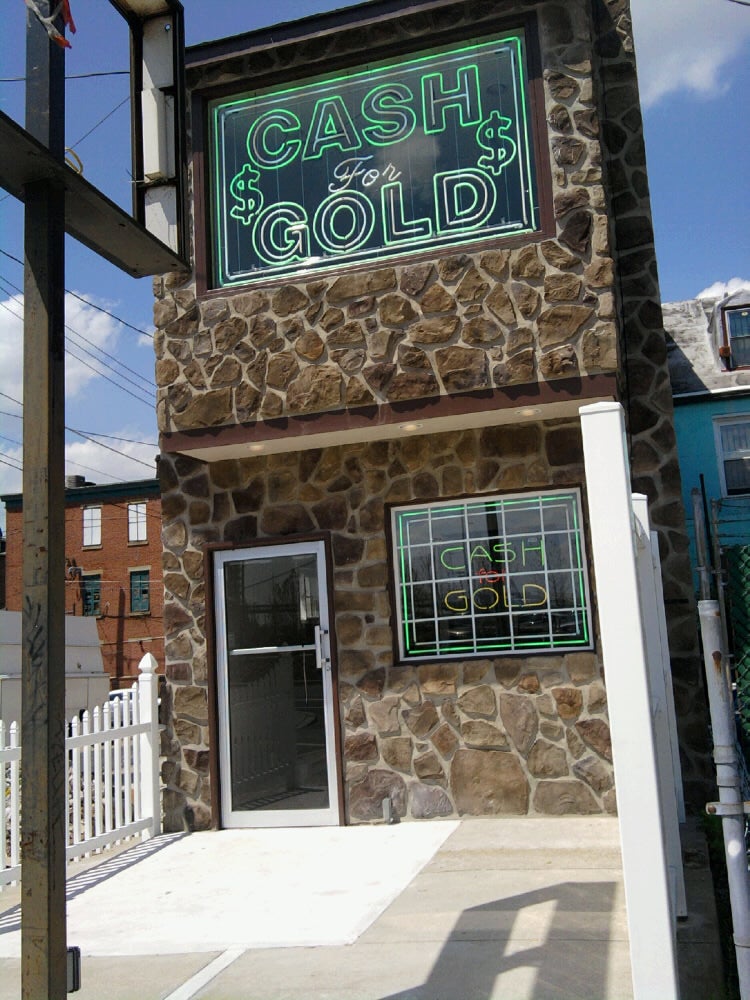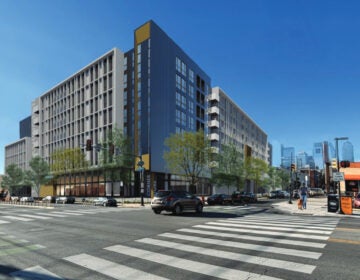“Cash for Gold” signs removed from Delaware Avenue store. Legislation would define cash for gold as pawn.

It wasn’t just the row house-sized store across from SugarHouse Casino that prompted a city councilman to introduce legislation specifically banning “cash for gold” stores from any spot where pawn shops are prohibited.
“This is apparently not just happening on Delaware Avenue,” said William Carter, Fifth District Councilman Darrell Clarke’s director of legislative affairs. “In talking to L&I, they have been popping up in various places.”
Carter said that cash-for-gold stores are a relatively recent phenomenon, spurred by the high price of gold and the economic downturn. While his boss, planners, and many residents who have complained consider a cash-for-gold store to be a type of pawn shop, the term cash-for-gold is not listed in the current zoning code. So business owners could open such stores even in places where pawn shops cannot, he said. It is a loophole, Carter said, that needed to be closed.
Clarke’s legislation, which was co-sponsored by First District Councilman Frank DiCicco and was introduced late last week, attempts to close the loop hole by making cash-for-gold stores a sub-category of pawn shops, Carter said.
The new zoning code, which is expected to go to city council for approval by the end of this year, also defines cash-for-gold stores as pawn shops. Carter said the issue couldn’t wait for approval of the new code.
L&I spokeswoman Maura Kennedy said it isn’t possible to give the a number of cash-for-gold stores in the city, because they seek permits identical to those held by typical jewelers – a jewelry store with a precious metal dealer license.
“There is no real easy way to parse out legitimate jewelers” from the kind of cash-for-gold places that raise neighborhood concerns, Kennedy said. The jewelers with precious metal licenses as a secondary use are required to keep the precious metal dealings to 25 percent of the businesses’ floor space.
L&I continues to work with Clarke’s office on the legislation he proposed, Kennedy said. But there is a need to proceed carefully so that jewelers are not hurt by any changes to the zoning code, she said.
“I’m not discounting the problems that perhaps a business billing themselves as cash-for-gold may cause in a neighborhood,” she said. “But we need to be careful so that we do not have the unintended consequence of impacting jewelry stores.”
The store across from SugarHouse has a permit to run a jewelry store with a precious metal dealer license. And the owner of the building has said his tenant would be operating a jewelry store. The store has a jewelry counter inside. It also has a large, safety-glass window with a circle for people to talk through and a pass-through slot.
Once a store with a jewelery permit and metals license is open, Kennedy said, “people can report what is happening” if they detect a problem.
The 25 percent alloted for precious metal dealing is measured in square footage, not receipts. So as long as 75 percent of the floor is dedicated to selling jewelry, it doesn’t matter where the bulk of the revenue comes from.
“That’s where our ability to enforce the code ends,” she said. “the way that the code is written and the enforcement mechanisms we have may not satisfy the communities’ underlying desires.”
L&I has ceased operations at some jewelers where the physical space for metal dealing exceeded the 25 percent limit, Kennedy said. She could not give PlanPhilly a number of such stores Monday night.
Clarke’s legislation will be assigned to a city council committee for a hearing, and then if the committee approves it, it will go to full council for a vote.
But should the bill pass council, it would have no impact on the store that brought the issue to Clarke’s attention.
That store, which fronts on Delaware Avenue but has a 112 E. Allen Street address, has not opened for business. The jewery store and precious metal permit and license it was awarded are compatible with the zoning of the parcel, and were granted over-the-counter.
What caught neighbors’ attention – and therefore the attention of Clarke and DiCicco – were the green neon signs in the windows. None of them advertised jewelry. “Cash for Gold,” they said. The store is in Clarke’s district, but it was DiCicco who authored the Central Delaware Zoning Overlay, which prohibits pawn shops in the area. The Commercial Entertainment District overlay that covers the SugarHouse property also prohibits pawn shops at the site because of its proximity to the casino.
When L&I posted a stop work order at the store recently, it was all about those signs, which have since been taken down.
“They either need to install signs in line with the zoning classification, or if they wish to go outside the guidelines, to seek a variance,” said Kennedy. As of Monday, the business had not filed an application.
“Once we see what the business is asking for, the signs they are requesting permits for, then we will make a ruling whether or not we will be issuing their permits over the counter,” she said.
Further south along the riverfront, in the Wawa strip mall at Tasker Street, there is an open check cashing store that is overtly prohibited by the Central Delaware Overlay and the Commercial Entertainment District that was put in place on the expectation that Foxwoods Casino would open at Delaware and Reed.
Over objections from the community and DiCicco, the business was given a variance by the zoning board of adjustment and has been open since winter.
In a brief interview last week, DiCicco said that in his opinion, the variance should not have been granted. “That’s why the CED was created,” he said. DiCicco said he was told about the approval right before council went on holiday break. He assumed the approval had just been given, and so thought he had plenty of time to appeal within the 30-day appeal window. But after returning from break, DiCicco learned the 30-day period had expired.
An appeal may be possible through the courts, he said. “But who has the money for that?”
Reach the reporter at kgates@planphilly.com.
WHYY is your source for fact-based, in-depth journalism and information. As a nonprofit organization, we rely on financial support from readers like you. Please give today.






